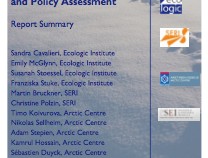Description
The Arctic is often referred to as the bellwether of global climate change. According to the Arctic Climate Impact Assessment and the most recent assessment from IPCC, the warming rate is twice that of the global average, with predictions of further increases leading to substantial loss of Arctic sea ice and large-scale thawing of the permafrost. The Arctic has also been a bellwether for the impact of long-range transboundary air pollution, both regarding human health and how pollutants affect wildlife. Persistent organic pollutants (POPs) and heavy metals (e.g. mercury) are transported long distances through air and water, are deposited in the Arctic and bioaccumulate through the food chain. Some indigenous peoples have a high exposure to these pollutants, primarily through their diet.
Though the people living in the Arctic and the ecosystems that sustain them are enduring the initial brunt of these environmental impacts, the region itself contributes little to the causes of climate change and production of pollutants.


